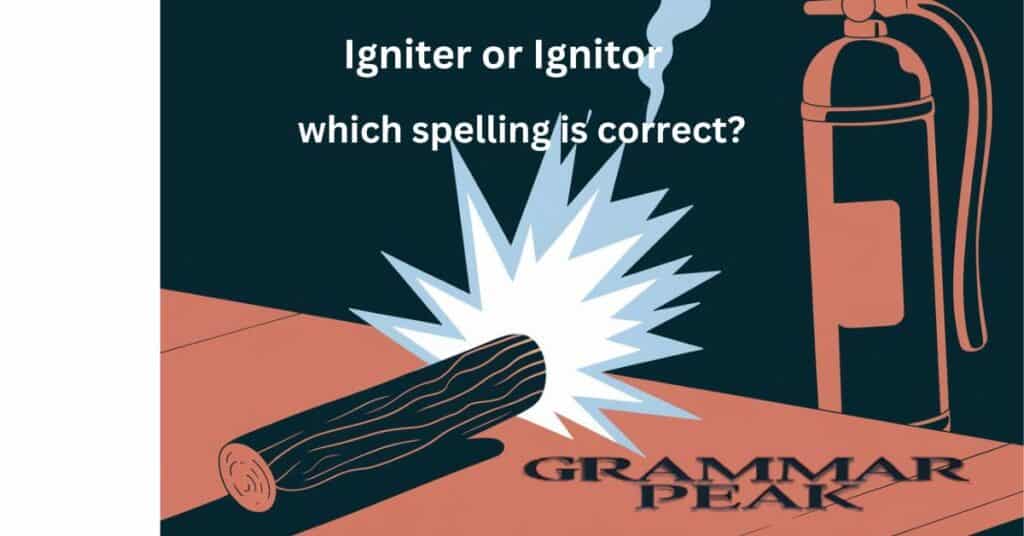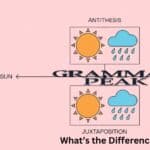In the realm of combustion and engines, there are two words that will absolutely confuse everyone: Igniter and Ignitor. They both refer to a device to initiate a flame, but what spelling do you choose?
In this piece, we will illuminate this hot question, examining the etymologies, definitions, and desired uses for each term under varying circumstances, from kitchen stoves to cars.
Why is There Confusion?
The question of ‘Igniter’ versus ‘Ignitor’ often stirs up puzzlement due to regional spelling discrepancies and industry-specific lingo. “In the realm of American English, writers utilize both terms, yet they may convey different implications in technical writing compared to everyday language use.”
In product descriptions, for instance, you might encounter both spellings. Similarly, in historical contexts, the usage of these terms can vary, contributing to the existing confusion. This variability in usage highlights the importance of considering the audience and the context when choosing between ‘Igniter’ and ‘Ignitor’.
Despite the confusion, understanding the subtle differences and the preferred contexts for each term can help guide your choice. Whether you’re writing a technical manual or a blog post about combustion engines, being aware of these nuances ensures your writing is accurate and contextually appropriate.
you will like Igniter or Ignitor: Which Spelling Should You Choose?
What Do “Igniter” and “Ignitor” Mean?
When we talk about ‘Igniter’ and ‘Ignitor’, both terms allude to a device that initiates a flame or combustion. In the context of an engine or a gas stove, these terms describe the component that produces the initial spark to light a flame.
However, the preference for ‘Igniter’ or ‘Ignitor’ can differ depending on the context and the region. This emphasizes the need to understand your audience and the specific industry jargon when drafting technical writing or product descriptions. With the knowledge of what each term means, you can use ‘Igniter’ and ‘Ignitor’ accurately in your writing.
Should You Use “Igniter” or “Ignitor”?
In American English, ‘Igniter’ is often the more favored spelling, particularly in modern texts.Writers commonly use this version of the term in various contexts, from casual conversations to professional documents.
However, ‘Ignitor‘ holds its ground in certain scenarios, especially in technical manuals or specific industry jargon. Choosing between ‘Igniter’ and ‘Ignitor’ greatly depends on your intended audience and the context in which you use the term. Understanding these nuances can ensure your choice between ‘Igniter’ and ‘Ignitor’ is accurate and contextually fitting.
| Criteria | Igniter | Ignitor |
| Definition | A device that initiates the process of combustion. | Same as ‘Igniter’. |
| Usage in Industry | Frequently used within industries such as automotive, appliances, and manufacturing. | Less common but still acceptable within the same industries. |
| Spelling Preference | Preferred spelling in American English. | Less common overall, but may be preferred in specific contexts or regions. |
| Commonality | More commonly used and recognized spelling. | Less commonly used and recognized. |
| Contextual Use | Used interchangeably with ‘Ignitor’ in various contexts. | Used interchangeably with ‘Igniter’ in various contexts, though less common. |
you might be Igniter or Ignitor: Which Spelling Should You Choose?
Synonyms of the Word “Igniter”
Numerous synonyms exist for ‘Igniter’, including
- Firestarter – People commonly use this term in camping and survival contexts to refer to a device or substance that starts a fire.
- Flame Generator – As the name implies, this term describes a device that generates flame and is often used in industrial and manufacturing settings.
- Pilot Light – This term frequently describes the small gas flame kept alight in home appliances such as gas stoves and heaters to ignite a larger gas burner when needed.
- Detonator – These devices play a crucial role in safely managing explosive materials, ensuring that detonations occur under controlled conditions.
- Incendiary Device – This term typically describes a device that starts fires or destroys sensitive equipment using fire in military and law enforcement contexts.
- Activator – In broader contexts, an activator can refer to something that triggers a reaction or process. In the context of ignition, it can be a device that initiates the combustion process.
- Fuse – In pyrotechnics, a fuse is a type of igniter used to initiate the combustion of explosives.
- Lighter – A common household item, a lighter is a portable device used to create a flame for igniting a variety of items, such as candles or cigarettes.
- Firestarter – In survival gear, a firestarter is a device that uses a spark to ignite a small amount of fuel, aiding in starting a larger fire.
- Flame Generator – In industrial settings, a flame generator is a device used to produce a steady flame for various processes.
- Pilot Light – In home appliances, a pilot light is a small flame that is kept alight constantly, and used to ignite the main burner when needed.
- Activator – More broadly, an activator can be any device that triggers a process or reaction. In the context of an ignition system, an activator could be a component that initiates the combustion process.
Examples in Context
- The igniter in the gas stove malfunctioned, so we had to light it manually with a match. In this sentence, ‘igniter’ refers to the device in the gas stove that initiates the flame.
- The car’s ignitor is malfunctioning, causing the engine to stall.” Here, ‘ignitor’ refers to the component in the car’s ignition system that starts the combustion process.
- We need to replace the igniter on the grill before we can use it for the barbecue. In this context, ‘igniter’ refers to the device on the grill that starts the flame.
- The rocket’s ignitor failed to initiate the engine’s combustion process.” In this sentence, ‘ignitor’ refers to the device in the rocket’s engine that starts the combustion process.
- The igniter in the furnace is not working properly, causing the house to be cold.” Here, ‘igniter’ refers to the device in the furnace that starts the flame.
- The ignitor in the fireworks failed, preventing them from launching.” In this context, ‘ignitor’ refers to the device in the fireworks that initiates the explosion.
- We need to replace the igniter in the gas lamp for it to work. Here, ‘igniter’ refers to the device in the gas lamp that starts the flame.
- The ignitor in the boiler is malfunctioning, causing the water to remain cold.” In this sentence, ‘ignitor’ refers to the device in the boiler that initiates the combustion process.
- The igniter in the oven is not working, preventing it from heating up.” Here, ‘igniter’ refers to the device in the oven that starts the flame.
- The ignitor in the firework is faulty, causing it to not explode.” In this context, ‘ignitor’ refers to the device in the firework that initiates the explosion.
- We need to fix the igniter in the gas heater for it to produce heat.In this sentence, ‘igniter’ refers to the device in the gas heater that starts the flame.
- The ignitor in the car’s engine is not functioning properly, causing the car to not start.
Origins of the Word “Igniter”
The term ‘igniter’ originates from the verb ‘ignite,’ which means to set afire or kindle. The suffix ‘-er’ is commonly added to verbs in English to create nouns, indicating a person or thing that performs the action of the verb. This formation is a standard practice in English, allowing for the creation of various nouns from verbs, enhancing the language’s expressiveness and clarity.
In this case, ‘Igniter’ refers to a device that performs the action of igniting, or starting a fire or combustion. The usage of ‘igniter’ has indeed evolved over time and has been adopted in various contexts, from everyday language to technical jargon. The term traces its origins back to the Latin word “ignire,” meaning to set on fire As ignition systems developed through the industrial revolution, the terminology surrounding them also evolved, leading to variations in spelling and usage across different regions and industries
FAQs
What is the difference between ‘Igniter’ and ‘Ignitor’?
Both terms refer to a device that initiates combustion. The difference lies in their usage, with ‘Igniter’ being more common in American English and ‘Ignitor’ often used in technical contexts.
Is ‘Igniter’ or ‘Ignitor’ the correct spelling?
Both spellings are correct. The choice between ‘Igniter’ and ‘Ignitor’ depends on the intended audience and the context.
What are some synonyms for ‘Igniter’?
Synonyms for ‘Igniter’ include firestarter, flame generator, pilot light, detonator, incendiary device, activator, and fuse.
What is the origin of the word ‘Igniter’?
The term ‘Igniter’ originates from the Latin word ‘ignitus’, meaning ‘to ignite’ or ‘set on fire’.
Which term is more commonly used in modern texts?
‘Igniter’ is the more commonly used spelling in modern texts, especially in American English.
Conclusion
Choosing the right spelling between ‘Igniter‘ and ‘Ignitor’ can be a tricky task, given their similar meanings and usage. However, understanding the context, audience, and regional preferences can guide you in making the right choice. Whether you’re writing about combustion-related terminology or crafting product descriptions, remember that consistency is key.

Mason Blake is an experienced blogger with a passion for language and communication. With years of expertise in crafting informative and engaging content, Mason shares valuable insights on grammar and writing. His clear, concise, and reader-friendly approach has earned him a loyal following, helping readers sharpen their language skills and master the art of effective communication.








Thank you for your sharing. I am worried that I lack creative ideas. It is your article that makes me full of hope. Thank you. But, I have a question, can you help me?
Thanks for sharing. I read many of your blog posts, cool, your blog is very good.
Your point of view caught my eye and was very interesting. Thanks. I have a question for you.
Thank you for your sharing. I am worried that I lack creative ideas. It is your article that makes me full of hope. Thank you. But, I have a question, can you help me? https://www.binance.com/zh-CN/join?ref=VDVEQ78S
I don’t think the title of your article matches the content lol. Just kidding, mainly because I had some doubts after reading the article. https://www.binance.com/join?ref=P9L9FQKY
I don’t think the title of your article matches the content lol. Just kidding, mainly because I had some doubts after reading the article.
Thank you for your sharing. I am worried that I lack creative ideas. It is your article that makes me full of hope. Thank you. But, I have a question, can you help me?
I don’t think the title of your article matches the content lol. Just kidding, mainly because I had some doubts after reading the article.
Can you be more specific about the content of your article? After reading it, I still have some doubts. Hope you can help me.
Thank you for your sharing. I am worried that I lack creative ideas. It is your article that makes me full of hope. Thank you. But, I have a question, can you help me? https://www.binance.info/cs/register?ref=S5H7X3LP
Thanks for sharing. I read many of your blog posts, cool, your blog is very good.
gcj1gj
981ycs
Your article helped me a lot, is there any more related content? Thanks!